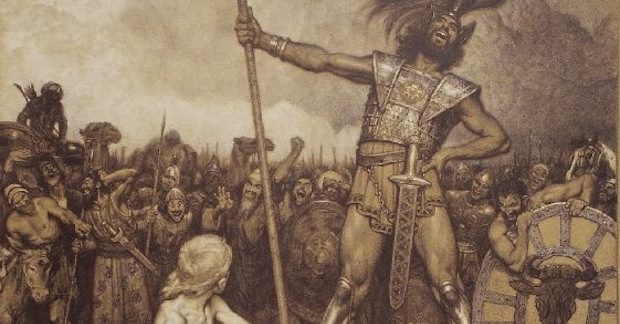Summary
Nate has some good questions in response to the previous episode on the Fall and Tim tries to answer them.
Transcription
Nate: Welcome back into Almost Heretical. We’re going to do a question and response episode, because I have a ton of questions after that last episode, I don’t know about you. Okay, so we talked about the Fall, and a number of things came up for me. First of all, this isn’t really a question, just a statement, but I—well, it kind of is a question, I have a question at the end of it—but I kind of grew up a little bit with that, I guess a little of the belief that Satan had some sort of, he wanted to be like God and he fell away as an angel, and so I guess I had some sort of… Is there a verse, is there something about that? Where do we get that?
Tim: Yes.
Nate: I mean, you mentioned in the Fall, part 1 episode, that the early church fathers, that was basically the common view amongst them. Where did they get that, where do we? I just know I grew up with that, so I’m trying to figure out where that came from.
Tim: Yeah, so okay, we’ll just do this right now, because here we are.
Nate: Oh, is this part 2?
Tim: No, this, we’ll see, it’s going to take more than a minute. I think I mentioned in an earlier episode that nowhere in the Old Testament is the word Satan used specifically—it’s possible in one verse—but it’s not used very commonly, I think it’s 7 or 8 times in the Old Testament, and it’s typically, specifically not a proper name. And in all the other places, it could be just as easily or probably better be interpreted as part of a normal improper noun meaning adversary or accuser, something along those lines, than it is a figure. And nowhere, nowhere in the Old Testament, is Satan connected to the serpent, the nachash, in Genesis. And that’s really telling. We can’t take it too far because we’re Christians and we have the New Testament. But it is really telling because it should open our minds essentially to kind of, some of the assumptions here, one of them, I’ll just point out this: part of the reason we’re doing this podcast is because most of us have very little supernatural in our worldview. Most of us have a hard enough time believing in one god, let alone a whole plethora of them all over the place. So Satan is about as far as a lot of us have been able to go in terms of pointing to some other divine spirit figure that might have some impact in the world, and it’s been easy for us to keep some sort of sense of Satan and hold onto the idea that monotheism means there is just one divine being because, essentially, Satan for a Christian has become this all-encompassing figure that allows us kind of say, “Well, it’s maybe God and Satan.”
Nate: Even if we don’t know where he came from or what he is or…
Tim: Yeah, even if we don’t have an explanation. And so to us, God and Satan doesn’t come close to God and a whole world of other elohim, spirit beings. It’s just this one kind of confusing piece. But what’s telling is that if that is the view of the Old Testament writers, that there was somehow just one figure, they would’ve clearly, multiple times, made the connection between the nachash, the tempter in Genesis 3, and a Satan figure or some of the other figures that get wrapped up in some of the Satan term. They didn’t. Why? Because they had a whole world of beings that they could point to as having effects on things happening in the world and influence. They believed in a whole plethora of gods, and they didn’t need to wrap them all up into one person, they didn’t have a problem holding a view with multiple malevolent beings in the divine realm, in the spirit realm. They could even, as you see in the gospels, have a view where they’re around every corner, where almost every other person Jesus runs into has one or more demons inhabiting them. So that’s the first piece. But when you get to the end of the Bible, the book of Revelation, and we’ll notice when you get to the New Testament, Satan is now used left and right, and at least in most places, is used as a kind of singular figure. And there’s a whole literary world of development between the Old Testament, and they call this intertestamental literature, between the Old Testament and the New Testament. And a lot of scholars will point to hellenistic influence, meaning Israelites were invaded by the Greek empire before the Roman empire, and Greeks had this approach, the Greek empire under Alexander and others had this approach: rather than killing everybody, they would essentially try to preserve the value, the cultural value of the people they would overtake by keeping them alive, especially the smartest of them, and then just indoctrinating them with their own cultural values and worldview and getting them to remain assets in the empire. So, all that to say, there was this trend that people point to, the term hellenism is used to kind of say the Greek-ification of other cultures. So there’s this term called hellenism, so say, for example, you’re applying it to ancient Israelites. It essentially means the merging of Greek culture, Greek imperial culture, with Jewish Israelite culture. A huge part, the main part of Greek culture is Greek religious ideas of the gods, the pantheon and a whole set of ideas around fate and all sorts of stuff. And that’s not to say that somehow Judaism got corrupted just because they were around people who thought differently. There are actually points, and this is where modern scholarship doing comparisons between the biblical texts and other cultures around the people that produce these texts creates these mind-blowing connections to say, “Oh! They were actually saying this thing, using this motif, using this metaphor because their neighbors, that’s how they thought about their god or their gods or their pantheon or whatever.” And they’re doing that, in a sense, to contextualize Jewish belief, but also to make more sense of it, to say, you know one example we use is Yahweh as the divine warrior who battles and defeats the other gods, and by defeating the other gods establishes Himself as true king. So if you remember, we won’t get into the text, but if you remember Job, the story of Job ends up—
Nate: Yeah, I was going to ask about that.
Tim: Yeah, it’s this long rant, essentially, that God goes on, “Where were you when I slayed Behemoth, and”—
Nate: Oh. That’s not what I was going to ask about. I was going to ask about them talking.
Tim: [laughing] We’ll get to the Satan piece later. But it’s this motif, and it gets used actually in connection with the Exodus story, that God slayed the chaos monsters of antiquity. Now there’s a sense in which that just kind of doesn’t jive with the broader biblical idea, which is that God is supreme because He’s the one true creator of everything that exists. But what they’re doing is essentially saying, “Hey, I’m going to give you this little polemic shot here, to say you think Baal is the one that conquered chaos and defeated the seas and the oceans and the darkness and the desert, and therefore reigns supreme, and I’m going to say no, no, no, what you want to ascribe to Baal, I’m going to ascribe that to Yahweh.” I’m using that as an example to say the push back in the evangelical world that is really afraid of these kind of comparisons studies, afraid of people like John Walton, who want to actually read other texts from other religions and say, “Hey, there are things here that we have in common, like the flood story and stuff like that,” we don’t have to be afraid of similarities in other places, and we don’t even have to be afraid of cultural, let me say cultural influence. This all started because we were talking about Satan, and scholars will essentially point to Greek cultural influence on Jews living under the Greek empire as the most likely explanation for why you move from what I’ll call a very primitive demonology in the Old Testament to, what you get to a few hundred years later by the time of Jesus, is a much more sophisticated, and by sophisticated I just mean more complicated demonology, where you have multiple named figures like Beelzebul and the Satan figure that get connected with other figures, and you have this whole concern with exorcism and demons possessing people that you simply don’t see in the Old Testament. There is no possession in the Old Testament. There is a clear development from one to the other. So that’s kind of step one in answering your question, Nate, is that there is this broader development going on that is trying to basically work out and explain and make sense of their preexisting spiritual divine cosmology view of the world, and their interaction with Greek culture, which had all sorts of its own myths about the daimonion, which is where we get the word demon, and these spirit figures that had different reputations and different functions that they played, had a significant influence. That doesn’t mean that it’s not inspired or not somehow authentic biblical texts or whatever. So one of the first things that we see, as part of this progression movement, is that it goes from being pretty simple, there’s this other realm with a bunch of beings. Some of them, at least, rebelled, and then we’ll get into, when we talk about the rest of the Fall and the Tower of Babel, there is kind of then this next step and growth of, some of these divine beings take on these more overt rebellion roles, and play out in sort of the idolatry concern in the Old Testament. And then what you get is this massive complication, where you have more figures, more characters, demons around every corner, and as a result of that, then you get a kind of simplification, and part of that simplification is to create an amalgam. I think the figure of Satan in the New Testament is an amalgam of ideas. What I mean by that is, it’s one figure, which has got pieces sticky-taped onto it from different places, different ideas. And so by the time you get to the end of the Bible in Revelation, it clearly says in Revelation 12:9—there’s nothing like this, even close to it, in the Old Testament—in verse 9 you have one idea here, a dragon, which is essentially a kind of chaos monster.
The great dragon was hurled down,
Tim: —that same dragon is
that ancient serpent,
Tim: —the nachash, who now for the first time we’re connecting that nachash in the garden to some other malevolent spiritual figure,
called the Devil
Tim: —diabolos, which is another word coming from Greek which has some other meanings to it
or Satan.
Tim: So by the time you get to end of the Bible, you now have, almost have you seen the new Planet Earth, where there are those trees that they let their seeds off that are so sticky that birds get so many of them stuck to them that they literally can’t fly anymore and they die? It’s like these ideas get all stuck in one place for the sense of helping us wrap our minds around obscure and complex ideas. And so what happens is New Testament writers, especially in light of Jesus, go backward, looking at the gospel, looking through the gospel back towards the Old Testament, and start kind of piecing things together retrospectively. So this is the first time that the nachash gets dubbed in with the Satan figure. And like I said, there were other, you’re reading it in the gospels before you get to Revelation, there are a whole bunch of other ideas that are already attributed to the figure of Satan that weren’t explained in the Old Testament. You don’t get a biography of Satan before you start reading the gospels, where Jesus is going to with Satan. It’s just assumed that you kind of have this sense in mind. But the other piece, which has created great confusion, some interesting theology and great confusion in church history is this idea of a morning star.
[transitional music]
Tim: We talked in an earlier episode that it just made natural, logical sense, and the Bible attests to it over and over again, that the ancients, and pretty much all cultures, looked up to the night sky and attributed some kind of divinity, some kind of supernatural life action when they looked up and saw bright globes, which they called stars and the moon and the sun.
Nate: I can’t really blame them, you know? I mean the thing’s floating up there?
Tim: No, exactly!
Nate: You can’t touch it. It’s in the same spot every night.
Tim: Yeah, we didn’t need to get into it. I mean, they didn’t know the earth was round had this view of the planet as essentially being this table on stilts, and they thought they were looking at the bottom of God’s world. That’s why, literally, the earth is deemed God’s footstool, as He was pictured as being seated on some sort of platform up in the skies above, resting His feet on the planet. But anyway, there’s a reason why, throughout the Old Testaments, you have multiple moments where the Israelites are specifically warned not to worship the stars. There are specific references to the sons of God—again, sons of God is a term referencing the highest order of the elohim who are in God’s tight-knit world who end up in rebellion—the sons of God are conflated with stars multiple times. It’s a kind of metaphor for divinity, metaphor for a divine being. Jesus actually ends up getting called the Morning Star in the book of Revelation. And the morning star, most scholars think, is a references to Venus, which is oftentimes the last planetary thing you could see as the sun’s coming up and the sky’s getting brighter in the morning, you start to be able to see less and less stars, and the last thing you can see before it’s just a normal blue sky is typically Venus. They call that the morning star because it hangs on the latest. So, pause for a second… Okay, go to Isaiah 14:12. And actually, before you go to Isaiah 14:12, if you just scroll up a little bit, Isaiah 14:3-4 makes it very clear what it is we’re reading here.
3 On the day the LORD gives you relief from your suffering and turmoil and from the harsh labor forced on you, you will take up this taunt against the king of Babylon
Tim: And then we start reading. So God’s giving the prophet Isaiah literally a taunt, basically this challenge, to the king of Babylon. That is explicitly stated in the text, that is who this is to. And you get down to verse 12, you have this line:
12 How you have fallen from heaven, morning star, son of dawn! You have been cast down to the earth, you who once laid low the nations!
Tim: Now, one of the words we didn’t see in that Revelation passage, which equated dragon, Satan, serpent, and Devil, one of the words we didn’t see, which you and I have both heard since we were little, is Lucifer. All that Lucifer is is the Latin translation of ‘morning star.’
Nate: Really?
Tim: That is the word that showed up in the Vulgate as the Latin word for star. The Vulgate was the first Latin translation of the Bible. Think about luminescence or illuminous, the root being light, it’s the same root here for morning star. The metaphor in Isaiah is that the king of Babylon is so pompous and haughty and arrogant, and has essentially seated himself in such high power, that he’s like the one star that refuses to go down at the end of the day. That’s the metaphor. And there’s no statement here that this passage is about anything other than the king of Babylon. So it’s using this morning star to use a known reference to make an analogy to the king of Babylon. In the Vulgate, then, when you’re reading this verse in Latin, what you’re reading is, “How you have fallen from heaven, Lucifer, son of dawn!” And we’ll get into this some more. Much of the intertestamental literature, like the book of Enoch, which we’re going to talk about, gets into explaining, sort of depicting, some mythology about that primordial fall which we were talking about, of divine elohim entering into rebellion, most likely before the nachash convinces Adam and Eve, and entices them as well. There’s literature there that references that as beings coming down, there’s this downward trajectory, from heaven to earth. I mean that’s the cosmology, that they live up there, we live down here, but the idea here is, there’s actually one story on a specific mountain, which we’re going to talk about later, where… there’s a story where some of the elohim coming down to earth to do what happens in Genesis 6, which is, they start sleeping with women, mostly likely implying —- of women, and it ends up being this further act of rebellion. So when you’re reading this, and you’re thinking, “Okay, you already have this one nachash character, who somehow was representative of the divine rebellion, and then you have this framework in your head for divine beings, at least one of them, who came down from heaven to entice the women from that place, and then you read this name of a figure. “How you have fallen from heaven, Lucifer, son of the dawn! You have been cast down to the earth, you who once laid low nations!” It sounded so much like a divine rebellion figure that Lucifer then got tacked onto this amalgam, by later Christian readers. Lucifer then got tacked onto this amalgam of the Satan-nachash figure; it was another name added to it. And then, once it was added to it, this idea of a fall from heaven, a reading of Isaiah 14:12 stopped being about the king of Babylon and started being now about this amalgam figure, Satan, the Devil, the nachash. And so, kind of the tension is that, in the end, that is just a language confusion. That is just an error in interpretation that is part of, actually, what led a lot of the church fathers to have the view that we’ve actually inherited a version of, which is a primordial fall of Satan: one figure fell from heaven as this Lucifer, decided to rebel against God in this primordial fall, turned into this kind of archnemesis of God. That’s where we get it. The irony is that a lot of that is just built on a misunderstanding of the text, but the case that we’re going to continue to walk through isn’t all that far from it. The important point of contention for us here is that it’s not starting with there being any one captain of this crew. The nachash isn’t framed in the Genesis 3 account as some great leader; he’s not said to have any position of high authority. What he is representing when he said, “You will be like us,” is this whole realm of beings that is somehow involved in this rebellion, and none of the Old Testament writers are doing anything to develop one figure who is God’s rival, or the chief enemy of humanity. Not even the satan, the references to a satan, in the Old Testament are doing that. But, what happens later, intertestamental text to the New Testament, is essentially like, an effort to make sense of all these ideas, compile them together, and you essentially have these figural representations. And we’ll explore much more later who Satan is and what the demons are and all that.
Nate: Right. Okay, that makes sense. That makes sense! Okay, that was question one. Well, that wasn’t even a question! That was great, that wasn’t even a question! Um, okay. But that’s helpful. I knew there was something there, but to realize that that was actually talking about the king of Babylon… and Babylon in the Bible is an archetype, right? So that was pretty crazy.
Tim: Yeah, so it’s kind of justified, right? So Babylon is archetypal. The Tower of Babel, which we’re going to talk about next episode, is the Tower of Babylon. It’s meant to be an archetype. And a king is representative of his people, so the reason Isaiah 14 is in there is in part to be an archetypal text, so it is in a sense justifiable to want to extrapolate that out.
Nate: Right, right. Okay, let’s go back to Genesis 1 and 3. Here’s my question:
[transitional music]
Nate: Genesis 1, we see that humans were created in our image—not our image, but the word our is used there, um where is that? Okay, right here!
26 Then God said, “Let us make humanity in our image, to resemble us, so that they make take charge of the fish of the sea…”
Nate: Okay, so that’s what we said, what you were saying in the Fall episode was that essentially that means created in the image of these divine beings. Is that what we’re calling them? Divine beings?
Tim: Yeah.
Nate: Okay, so we have that. And then we have Genesis 3, which says… okay it’s the temptation of the serpent to the woman:
5 “God knows that on the day that you eat from it, you will see clearly and you will be like God, knowing good and evil.”
Nate: And we said there that it’s saying you will be like gods, like the divine beings. So here’s the question, and you probably see where I’m going with this: Genesis 1 talks created in the image of the gods. Genesis 3 says if you eat that, you will know good and evil, you will be like the gods. Why do they need to eat of the thing to become like something that they were created in the image of?
Tim: Yeah, right, right. And that was the clarification that we tried to talk through, is in what sense are they now moving from not being like them to becoming like them at the point of eating the fruit?
Nate: Which is where we said they knew good, the air they breathed was good.
Tim: They already knew good, and now they’re knowing evil.
Nate: Evil was the piece, okay.
Tim: And that line was repeated twice, by the serpent and then affirmed by God, that is the difference. So to be made in the image of God, the icon of God, the reflection of God, is about essence and it’s about purpose, vocation. To be made like the elohim, who were at that point the rulers of everything that was made, to be made in that image was to be kings, rulers, and with a kind of shared, and we’ll get into this later, a sense of shared divine essence. At the beginning, us, we humans, Adam and Eve, weren’t ever supposed to die. There is very much a sense, they were enfleshed, they natural beings, they weren’t spirits, but they somehow were sharing in the divine essence. So that already exists when you get to chapter 3, and there’s another sense where something is true of elohim that has not yet been true of Adam and Eve, and that is part of the argument to me that says, something had to have already happened with them, that they would have gone from knowing just good to knowing evil. Which is why I’m suggesting that there had to have been some sort of fall assumed. It doesn’t get into the sense of how or the scale of that fall was, but it’s asserting is that the elohim knew both good and evil as a race of beings, essentially, and that now Adam and Eve are going to take the human race into that same place.
Nate: Ah, okay, I gotcha. So being created in the image of something doesn’t necessarily mean you have… obviously doesn’t necessarily mean you have all of the knowledge and everything that the thing has.
Tim: Yeah. There’s a reason why it’s different language, “made in the image” in Genesis 1, and “you will become like” in Genesis 3.
Nate: Ah, yeah, okay. Okay, final question, let’s see if I can put this one together. So we said a lot in the Fall episode about the humans losing the divine beings, as in, that was the whole reason for the difficulty in bearing children. You need to make all these children so that you can work the ground, because you have to rule this land now without those divine beings. But it seems to me in Genesis 3 that, by taking the fruit and giving into the temptation of the devil—the devil, that’s not even there! The serpent, look at me! By taking that, aren’t they kind of joining the “dark side”? Why would they lose those beings by giving into the rebellion, you know what I’m saying?
Tim: Yeah, and honestly, I think that it’s a really rich story that literally takes place in less than a page of writing. So the idea that I’m suggesting is that, what makes the most logical sense, and again, there’s Jewish literature that was saying these same things, is that the main motivation—and let’s just be straight, in the world you and I come from, there is no explanation for the motivation of the serpent. There’s none, there’s no explanation for what he’s trying to gain, for what the nachash is trying to gain from this.
Nate: Right. Except, “It was God’s plan all along.”
Tim: [laughing] Oh, you get us into bad places, Nate. Uh, so the idea is in kind of this exposition that I’m championing, there is a rebellion. We aren’t told how long in spacetime or in time—
Nate: Spacetime! Wow—
Tim: Well, I guess there’s no space, apparently. Who knows? I’m getting in over my head. We’re not told how long God existed with other divine spirit beings before He created what we’re reading about in Genesis 1 and 2. We don’t know. It’s not important to the biblical authors. What we do know is that something happened in between Genesis 1 and Genesis 3 that put them in the position of knowing both good and evil. And what I think some of that logically is trying to indicate to us, is that it is what is happening in the creation accounts that triggers the rebellion. And that was the case I was making last time. If you picture this world where—so let’s use a horrendously loaded example right now. If the President of the United States has his top fifty closest chief of all his different cabinets and whatnot, and they’re his fifty people that are tasked with having the most power in his little empire, and then, let’s say—and I’m not making the case that this is an analogy for the creation accounts—but let’s say then Trump goes and takes over three little countries in central America. And it’s now up to us, we pillage everyone, destroy everybody, and now it’s up to us—
Nate: Absolutely none of this sounds crazy to me either, I’m just like, “Okay, that could happen, okay.”
Tim: [laughing] Yeah, let’s just imagine that happens in like, 2022. And it’s up to Trump to decide who gets to rule this land that we now have. What is the feeling of those fifty most high powered officials in Trump’s cabinet going to be if he chooses completely other people, other than the highest ranking people, to say, “You guys get to rule this new space”?
Nate: Yeah, I get that. But then he chooses someone else. And that someone else is then tempted into also seizing power by that group, and don’t those people join that group then? How do they lose that group?
Tim: Yeah, so I get your tension, but before we jump forward, if we recognize that there’s a logical sense in which the motivation is explained by a jealousy for control and power and rulership, then in a sense, what the nachash is doing, and we made this case last time, is saying, “Join our side. Join the rebellion.”
Nate: The nachash is the serpent, right? Just to reset.
Tim: Yes, the serpent, if we use that word, is saying, “Join the rebellion.” And maybe that’s actually what the serpent wanted. But does it matter more, if the main point is that you wanted that person’s power, that they join your side or not, or the fact that they just got taken off the throne themselves. And we’re going to get into this, but the background, the worldview background behind the text is, these same sons of God, and this is the next part of the fall we’re going to get into, end up becoming the rulers of the world. They end up becoming the gods of the other nations who replace, essentially, Adam and Eve as the ones who are truly ruling the world. And the reason that they end up getting worshipped in a form of idolatry is because they actually are the gods of those nations. And in a sense, they didn’t have to get Adam and Eve’s loyalty to their side in order to have, basically, a massive victory in what they were trying to accomplish, which was to get power for themselves. So, if the picture was Adam and Eve have all the cards on earth, and the elohim have all the cards in heaven, in the heavenly realm, both of that happening underneath God’s power, if that’s the picture, and now what we end up looking at is that this world here is not ruled by humans, in the deepest sense of the biblical worldview. Ultimately, it’s being affected by the gods, the demonic beings, the malevolent, rebellious spirits. And this is New Testament through and through, that the thing we are against, Paul’s theology is the thing we’re at against is principalities and powers.
Nate: Not flesh and blood, yeah.
Tim: There are clear connections between those words that he is using and this rebellion rulership language, the divine rulership language. These are divine rulers. And so essentially they win. They don’t win in full, but basically it’s a complete fall. The whole creation suffers for it, but humans specifically gave up a whole heck of a lot, and what ends up happening, the kind of rulership that happens in place ends up being horrible, atrocious, and nothing like God wanted. So that then creates this, you know, narrative sense that something has to be done about this. Somehow the world needs to be set to right, and getting back on track to being ruled well and fixed from this fall. And therefore, and we’re going to get into this a lot, I think it’s one of the most important pieces for Christian theology, especially when we get into issues of power and all that. There’s the sense that we’re supposed to be taking rulership of the world from the beings that stole from humanity, taking it back, because God wanted humans to be ruling this place in the first place. That was why he created Adam and Eve and called them to be the kings. But then we get into the question: what kind of people would actually be able to rule this world as God had originally intended Adam and Eve and their family to rule it? So that is some of the backdrop, that in my life, until the last year or two, has just been missing. And you end up then, coming up with explanations for a lot of texts and passages and New Testament epistles that are just, now I look at it as just missing the point and missing some really big points about what this whole story is about.
Nate: So we don’t have to get into this now, but you believe this has real implications for how we live with each other, do Christianity, be Christians, all that kind of stuff. You believe this has real implication, real changes can be made, if we see this differently.
Tim: Yeah, totally, I mean we said up front that we kind of have to pay our dues while we build a new framework, because so much of this is so foreign and we’re missing a lot of pieces, but once we start to put that framework together and then go back and try to do Christian theology and life and ministry and community and all of that, a bunch of things start to pop. Just one little example, it’s more of a teaser, we’ll get into more of this later on. If you look at 1 Corinthians 6, some of you guys may remember a kind of like, “Uh, what?” So Paul is dealing with, essentially disputes in the church in Corinth and how, a very practical matter of how Christians aren’t getting along. The situation he’s railing against is the idea that a Christian would sue another Christian. And he just drops a little of what I’ll call this divine council worldview. Not just that there are other spiritual beings, but it’s this of Paul’s indicating that this whole cosmological redemptive theology of what the Fall actually was, what ought to be, and therefore where redemption is trying to take us. So he goes, in verse 1
1 If any of you have a dispute with another, do you dare take it before the ungodly for judgment instead of before the Lord’s people? Or do you not know that the Lord’s people will judge the world? And if you are to judge the world, are you not competent to judge trivial cases? Do you not know that we will judge angels?
Tim: I mean, do you? I didn’t know that.
Nate: Whoa. I kind of forgot about that. I haven’t thought about angels since that Newsboys song, you know?
Tim: [laughing]
3 How much more the things of this life? Therefore, if you have disputes about such matters, do you ask for a ruling from those whose way of life is scorned in the church? I say this to shame you. Is it possible that there is nobody among you wise enough to judge a dispute among believers? But instead, one brother takes another to court—and this is in front of unbelievers!
Tim: Paul’s just doing basic pastoral situational care or reconciliation, trying to deal with a couple people taking each other to court, and he goes to the logic that he assumes everybody understands, everybody, these illiterate new Christians are able to know, which is that God’s people are going to not only judge the world, literally rule the world, but are going to rule angels. You’re just supposed to know that, and then you’re supposed to be able to deduce from that that you sure as hell ought to be able to figure out how to not take each other to court.
Nate: Hmm.
Tim: And I bring this up as kind of an interesting peek example, but we’ll get into this study later. The word angels ends up being used in the New Testament in a bunch of places where, in Hebrew, the word elohim would’ve been used, in Greek, the word angelos, or angel as just a transliteration gets used. Paul’s cluing us in here. This is a little window for us moderners into what he actually has in his head, that the church, the people of God, in some way are being used to reconcile what originally went wrong in Genesis 3 and beyond, and to get back to what the goal of creation and Adam and Eve was, which was for humanity, God’s chosen humans, to rule the world in partnership with Him. And who’s in the way, who’s doing that right now? In a large part in Paul’s theology, it’s angelic beings, elohim, who through what we were just talking about, through this successful tactic in the garden, essentially seized power in the world, the realm, where they weren’t supposed to have all that much power. And there’s a whole litany of places where we’ll go with this in the New Testament. So that’s just one small example that eventually we’ll get back to. Not only does this stuff matter, it’s relevant, it is weird and uncomfortable and we got to keep working through it, but honestly, it’ll flip some of the most important paradigms and doctrines of our faith on their head.
Nate: Yeah, it seems like that’s going to change everything about what we think that we’re here for, what we’re doing. We’re not just waiting around for the rapture. Alright. That’s cool, that’s the question and response, and we’ll get to the Fall part 2 next. If you wouldn’t mind, if you have just a couple minutes, if you could jump on iTunes right now and leave a rating and a review for this show? It helps other people find the show and it takes thirty seconds. If you could do that real quick, that’d be sweet. Big shout out to Cale Haugen! All the music on Almost Heretical is produced and recorded by him. Catch you guys next time!
Tim: Peace.









